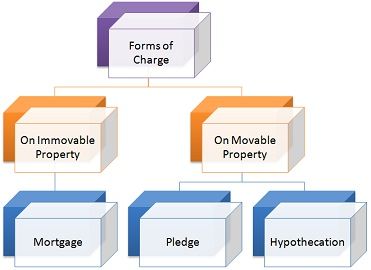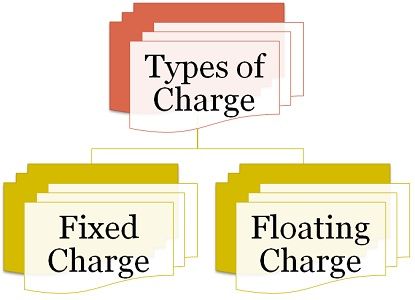 Charge denotes an impediment over the title of the property, i.e. when the charge is created on an asset, the asset is not allowed to be sold or transferred. Basically, there are three ways through which charge is created on the property, that are classified according to the movability of the asset, i.e. On movable property, the charge is created by way of pledge or hypothecation, whereas when the charge is created on an immovable asset, then it is known as Mortgage.
Charge denotes an impediment over the title of the property, i.e. when the charge is created on an asset, the asset is not allowed to be sold or transferred. Basically, there are three ways through which charge is created on the property, that are classified according to the movability of the asset, i.e. On movable property, the charge is created by way of pledge or hypothecation, whereas when the charge is created on an immovable asset, then it is known as Mortgage.
The basic purpose of creating a charge is to gain financial assistance from the lending institution. There are many students, who juxtapose charge and mortgage, but they are different. The former is just a collateral, for the payment of the amount due, whereas the latter is the transfer of interest in the asset, as collateral. To know some more important difference between charge and mortgage, you need to check out the article given below.
Content: Mortgage Vs Charge
Comparison Chart
| Basis for Comparison | Mortgage | Charge |
|---|---|---|
| Meaning | Mortgage implies the transfer of ownership interest in a particular immovable asset. | Charge refers to the security for securing the debt, by way of pledge, hypothecation and mortgage. |
| Creation | Mortgage is the result of the act of parties. | Charge is created either by the operation of law or by the act of the parties concerned. |
| Registration | Must be registered under Transfer of Property Act, 1882. | When the charge is a result of the act of parties, registration is compulsory otherwise not. |
| Term | Fixed | Infinite |
| Personal Liability | In general, mortgage carries personal liability, except when excluded by an express contract. | No personal liability is created, however, when it comes into effect due to a contract, then personal liability may be created. |
Definition of Mortgage
The mortgage can be defined as the transfer of interest, in a particular immovable asset such as building, plant & machinery, etc. in order to secure payment of the funds borrowed or to be borrowed, an existing or future debt from the bank or financial institution, that results in the rise of pecuniary liability.
It is something in which special interest in the property mortgaged, is transferred by the mortgagor in favor of the mortgagee, so as to assure the payment of money advanced. The ownership of the property remains with the mortgagor (borrower/transferor), but the possession is transferred to the mortgagee (lender/transferee). When the mortgagor does not make payment in time, the mortgagee can sell the asset, after giving a notice to the mortgagor.
Definition of Charge
By the term ‘charge’ we mean, a right created by the borrower on the property to secure the repayment of debt (principal and interest thereon), in favor of the lender i.e. bank or financial institution, which has advanced funds to the company. In a charge, there are two parties, i.e. creator of the charge (borrower) and the charge-holder (lender). It can take place in two ways, i.e. by the act of the parties concerned or by the operation of law.
When a charge is created over securities, the title is transferred from the borrower to the lender, who has the right to take possession of the asset and realize the debt through legal course. The charge on various assets is created according to their nature, such as:
- On Movable stocks: Pledge and Hypothecation
- On Immovable property: Mortgage
- On Life such as insurance policy: Assignment
- On Deposits: Lien
There are two types of charge:
- Fixed Charge: The charge which is created on ascertainable assets, i.e. the assets which do not change their form like land and building, plant and machinery, etc. is known as fixed charge.
- Floating Charge: When the charge is created over unascertainable assets, i.e. the assets which change its form like debtors, stock, etc. is called floating charge.
Key Differences Between Charge and Mortgage
The difference between charge and mortgage can be drawn clearly on the following grounds:
- The term mortgage alludes to a form of charge, in which the ownership interest in a particular immovable property is transferred. On the other hand, Charge is used to mean the creation of right over the assets in favor of the lender, for securing the repayment of the of the loan.
- The mortgage is created out of the act of the parties concerned, whereas charge is created either by the operation of law or by the act of the charger holder and charge creator.
- A mortgage requires compulsory registration under the Transfer of Property Act, 1882. Conversely, when the charge is created as a result of the act of the parties concerned, registration is must, but when the charge is created by operation of law, no such registration is needed at all.
- The mortgage is for a specified term. Unlike charge, which continues forever.
- A mortgage carries personal liability, except when it is specifically excluded by an express contract. As against this, no personal liability is created. Nevertheless, when the charge comes into effect due to a contract, then personal liability may be created.
Conclusion
By and large, the creation of charge provides security to the lender that the amount lent to the borrower will be repaid. On the other hand, in mortgage, the borrower is bound to pay the mortgage money or else the amount will be realized by selling the asset, so mortgaged, but only by order of the Court, in a suit.








Leave a Reply